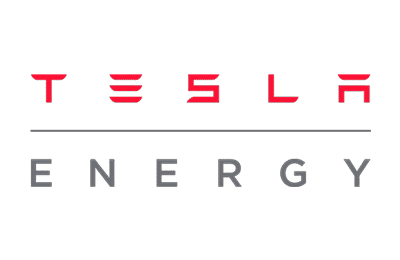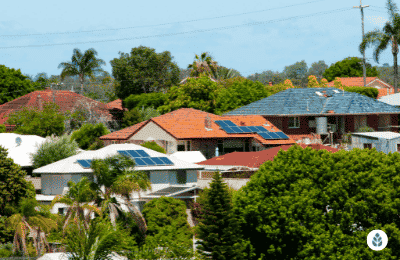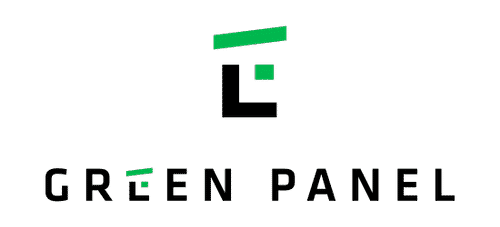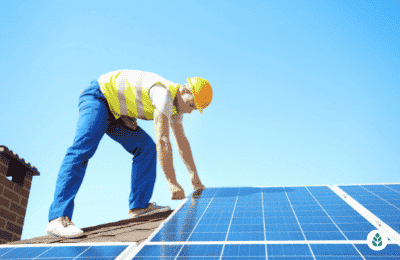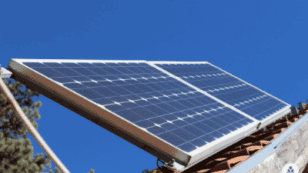
Top 7 Best Solar Companies in Michigan (2024 Reviews)
In this guide to Michigan’s best solar companies, you’ll learn:
- What are the best solar installers in MI?
- How can I save money on solar conversion in MI?
- What are the most important traits to look for in a MI solar company?
Each product and or company featured here has been independently selected by the writer. You can learn more about our review methodology here. If you make a purchase using the links included, we may earn commission.
Michigan is an excellent place to go solar, primarily because the electricity rates being high translate to above-average energy savings with a photovoltaic (PV) system. The average solar system in Michigan pays for itself and then provides over $32,400 in net savings thereafter. Unlike some states, the challenge isn’t deciding whether or not to go solar; it’s choosing a reputable company to handle the installation.
In this guide, we’ll be sharing what we believe to be the best solar companies in Michigan. We’ll explain why we’ve chosen each one, why we feel comfortable recommending them to you and what we suggest looking for in a solar provider in case you decide to continue your search for the best solar contractor in your area.
What Are the Best Solar Companies in Michigan?
We’ve put a lot of time and effort into researching local solar installers and seeing where they excel and where they fall flat. Below are what we believe are the best solar companies in Michigan overall:
- SunPower: Best National Provider
- Blue Raven Solar: Best Financing Program
- Tesla: Best Technology
- Windfree Solar: Best Regional Provider
- Stellar Solar: Most Local Experience
- Michigan Solar Solutions: Best Local Installer
- Strawberry Solar: Best Customer Service
Compare Michigan’s Top-Rated Solar Providers
Our top recommendations include SunPower and Windfree Solar, but we do feel that any of the companies mentioned above will be able to meet your needs and your expectations. We’ll provide a side-by-side look at these two companies and our other recommendations in the table below.
| Solar Providers | Superlative | Our Score | Avg Cost | Warranty | Financing Options | Get Quote |
| SunPower | Best National Provider | 5/5 | $$$$ | Minimum of 25 years for equipment, workmanship and production | Cash, solar loan, solar lease, PPA | Get Quote |
| Blue Raven Solar | Best Financing Options | 4.5/5 | $$ | 25 years for equipment and performance; 10 years for workmanship | Cash and solar loans | Get Quote |
| Tesla | Best Technology | 4.5/5 | $$ | 25 years for equipment and performance; 10 years for workmanship | Cash, solar loan, solar lease, PPA | Get Quote |
| Windfree Solar | Best Regional Provider | 4/5 | $$$ | 25 years for equipment and performance; 15 years for workmanship | Cash and solar loans | Get Quote |
| Stellar Solar | Most Local Experience | 4.5/5 | $$$$ | 25 years for equipment, performance and workmanship | Cash, solar loan | Get Quote |
| Michigan Solar Solutions | Best Local Installer | 4/5 | $$$ | 25 years for equipment and performance; 5 years for workmanship | Cash, solar loan | Get Quote |
| Strawberry Solar | Best Customer Service | 4.5/5 | $$$ | 25 years for equipment and performance; 10 years for workmanship | Cash, solar loan | Get Quote |

SunPower
Pros
- Most efficient panels on the market
- National coverage
- Cradle to Cradle sustainability certification
- Great warranty coverage
Cons
- Expensive
- Customer service varies by local dealer

Blue Raven Solar
Pros
- Industry-leading in-house financing
- Competitive pricing
- Excellent reputation
Cons
- Doesn't offer solar batteries (coming 2022)
Blue Raven Solar is known for introducing one of the most accessible solar loan options in the industry, which helps keep solar ownership a realistic option for many customers.
The company offers very limited service offerings, but we still feel it’s a great option for homeowners looking for a bare-bones system.
Why We Chose Blue Raven Solar as the Company With the Best Financing Program
Solar panels are expensive, and while we recommend cash purchases or solar loans above other financing options, those aren’t always viable options for homeowners because of the upfront or monthly pricing of the arrangements. Blue Raven more or less fixed that issue with its BluePower Plus+ financing program.
This loan option includes no down payment requirements and a low interest rate to help keep things affordable. More importantly, it offers 18 months of payment-free financing. That means you get a year and a half to accrue savings on your energy bills, which you can then put toward paying off your system. Ultimately, this helps keep solar affordable upfront and helps reduce the financial burden of paying them off over time.
Blue Raven also delivers excellent customer service, especially for such a large company. Plus, it has below-average pricing to begin with, which just serves to make its services more accessible.
What We Don’t Like
Blue Raven Solar only installs solar panels in most cases. It’s starting to add solar batteries to its lineup of products, but they’re not widely available yet. This is a pretty significant downside in Michigan, in particular, where the lack of a statewide net metering program means batteries are an integral part of a solar system if you want to maximize your energy savings.
Blue Raven Solar also only accepts cash and solar loans through its in-house financing programs. This isn’t a huge downside since the financing program is exceptional and designed to be as accessible as possible, but we still do prefer companies that have more payment options.
Read our full review of Blue Raven Solar for more information.
Solar Products
Blue Raven installs panels from Canadian Solar, Trina, Hyundai and SolarEdge. These are all solid options overall, but we’d recommend the Trina panels. These have the highest efficiency ratings of the bunch, which means they’ll be the most likely to offset your electricity consumption, especially if you couple your panels with a battery.
If you want to keep costs down, the SolarEdge panels are likely going to be your best bet. These have the lowest cost per watt, and although the efficiency rating is a bit lower, it’s still a great option that delivers above-average quality for the money.
Unfortunately, Blue Raven doesn’t install batteries or EV chargers, nor does it provide access to other solar services. This is only a suitable company to choose if you know you just want panels.
Financing Options
Blue Raven only accepts cash purchases and solar loans through its in-house financing programs. We recommend a cash purchase if you can make it work, as that will lead to the fastest panel payback period and the most solar savings over time.
Blue Raven’s loan program is also super beneficial if you can’t make a cash purchase work, and it can help you reach net savings faster than many other solar loan options. We still would like to see low-cost options like leases and PPAs, though.
Warranty Information
Blue Raven Solar includes a 25-year warranty for the panels it installs and the production of those panels. The power production warranty is a little longer than most companies offer, but the equipment warranty is in line with the industry standard.
You also get a labor warranty that lasts for ten years, which is average. Ideally, we’d like to see above-average coverage for the labor in Michigan, given the elevated risk of panel damage from severe weather and roof leaks from heavy snowfall. Still, the warranty coverage from Blue Raven is good and does offer some peace of mind.
Facts and Figures: Blue Raven Solar
| EcoWatch Rating |
|---|
| Better Business Bureau (BBB) Rating |
| Year Founded |
| Average Cost ($-$$$$$) |
| Solar Services |
| Brands of Solar Equipment Offered |
| Warranty Coverage |
| 4.5 |
| A+ |
| 2014 |
| $$ |
| Solar Panels, System Monitoring |
| Trina Solar, Canadian Solar, SolarEdge, Silfab, SunPower |
| 25-year manufacturer warranty; 10-year workmanship warranty, 2-year production guarantee |

Tesla Energy
Pros
- Price-match guarantee
- Sleek, efficient and durable solar panels
- Best solar battery on the market
Cons
- Some reported issues with customer service
- Customer service varies by local dealer
Tesla manufactures one of the best solar batteries in the industry. It works beautifully with your panels to maintain power through blackouts, and it comes with some helpful features that prepare your property for storms.
Tesla’s customer service is spotty due to outsourced labor, but we still feel it’s a decent option.
Why We Chose Tesla as the Company With the Best Technology
As a tech company, it’s probably no surprise that Tesla’s technology provides a seamless user experience at every turn. Its solar battery, the Powerwall, is the prime example of this.
The Powerwall effortlessly maintains power for your home through power outages with no interruptions, which is ideal in a place like Michigan, where blackouts are relatively common. Plus, they have a feature called StormWatch, which allows them to monitor weather conditions in your area and automatically store excess power in preparation for a power outage risk.
The Powerwall also lets you tune how your stored energy gets used, which means you can easily maximize your long-term savings, store the maximum amount of energy to persist through outages or find a happy medium.
Tesla’s pricing is also below average, and it offers a price-match guarantee, which helps keep its products and services more affordable than you’d find from most competitors.
What We Don’t Like
Tesla outsources all of the installation work to third-party companies, which means the customer service varies quite a lot depending on which company is assigned to your solar project.
Another minor downside to working with Tesla is that it only carries a single brand of each product, including QCells panels and Tesla-branded EV chargers and batteries. The equipment is all high-quality, but a variety would be nice and would help the company’s offerings appeal to more homeowners.
Read our full review of Tesla for more information.
Solar Products
As mentioned above, Tesla only installs QCells panels. These panels have an above-average efficiency rating and should be plenty powerful to help provide adequate savings, even in Michigan’s minimal sunlight. They also go through rigorous testing protocols, so they’re one of the least likely panels to run into issues due to manufacturer defects.
QCells panels also provide great quality for the money, coming in around $0.25 cheaper per watt than comparable panel options. This helps keep the relatively high cost per watt in Michigan as low as possible without sacrificing on power production.
Below is a list of other products and services you can get through Tesla:
- Tesla Powerwalls
- Tesla solar roof
- Tesla EV chargers
- The Tesla solar monitoring app
Financing Options
Tesla keeps clean energy accessible by accepting all four major payment options. We recommend going with a cash purchase, as this will lead to panel ownership and the highest savings possible over time. A loan is also a highly recommended option if you can’t make a cash purchase.
Solar leases and PPAs save much less money over time and don’t lead to panel ownership, so we don’t generally recommend these options unless they’re the only ones that work for you.
Warranty Information
Tesla’s warranty coverage is mostly in line with the industry average. The equipment warranty lasts for 25 years, which is what most companies offer, and the labor warranty lasts for ten years, which is also typical. We would like to see lengthier workmanship coverage in an area like Michigan, but Tesla’s ten years is still good.
You also get a power production guarantee, which lasts for 25 years. This is about five years longer than most other companies include, making it a welcome addition in Michigan, where sun availability is limited.
Facts and Figures: Tesla Energy
| EcoWatch Rating |
|---|
| Better Business Bureau (BBB) Rating |
| Average Cost ($-$$$$$) |
| Solar Services |
| 4.5 |
| C |
| $$ |
| Solar Panels, Solar Batteries, EV Chargers, Solar Roof Shingles, System Monitoring |

Windfree Solar
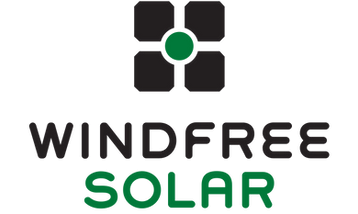
Local Service
Average cost
Pros
- Excellent reputation
- Outstanding workmanship
Cons
- Slightly limited service area
- May be overqualified for residential systems
- No leases or PPAs
Windfree Solar is a small regional company that acts more like a local installer in its customer service and hands-on solar conversion process.
The company doesn’t serve all of Michigan, so some customers might be outside of its service area. If you are inside it, though, we think Windfree is a solid option.
Why We Chose Windfree Solar as the Best Regional Provider
Windfree Solar has been a big part of the local solar industry since 2009, so it has over a decade of localized experience. Not only does the company understand the specific energy needs of Michigan residents, but it also provides the kind of outstanding customer service you’d expect from a smaller company.
Perhaps most importantly, this provider only operates in Michigan and Illinois, and its representatives are intimately familiar with the solar incentives and local rebate programs. They can help you file for any and all perks available in your specific area, which larger, less hands-on companies very well might miss.
Windfree’s customer service goes well beyond incentives, and you’re sure to have a positive experience from start to finish. This is evidenced by the company’s A+ rating with the BBB (Better Business Bureau) and the outstanding 4.7-star rating on Google Reviews.
Finally, the company provides an above-average workmanship warranty, which is great to have in Michigan.
What We Don’t Like
Windfree Solar is a relatively small company that only serves parts of Michigan and Illinois. That means some residents in the Great Lakes State may not be able to go solar with the provider.
Additionally, you’ll be limited in your payment method if you choose Windfree, as it only accepts cash and loans. These are the only options we usually recommend, but other low-cost options like leases and PPAs would be nice to have.
Solar Products
Most solar installers work with just a few brands of solar equipment, but Windfree makes its systems truly customizable by working with any tier-one monocrystalline brand you might want for your home.
Its technicians can help you figure out which option works best for your budget and energy needs and will then design the system around that specific brand. This is a really great way to get the exact system you want without being shoehorned into a specific brand.
In addition to the variety of solar panels offered, Windfree provides access to the following products and services:
- Enphase IQ batteries
- LG Chem solar batteries
- The Enphase solar monitoring app
- Commercial solar applications
Financing Options
Windfree Solar only accepts cash purchases and solar loans, so, as is the case with many local and regional providers in the area, you won’t be able to take a solar lease or PPA.
Of the two options available, we recommend a cash purchase if you can afford it. Paying in cash means you own your system immediately, and you’ll avoid paying interest that would cut into your savings over time. Cash also leads to the fastest solar payback period because of the lack of interest.
Both options let you take the federal credit, though, so both will be more beneficial than leases or PPAs.
Warranty Information
Windfree Solar shines compared to many competitors when it comes to warranty coverage. Its equipment and panel production warranties are close to what most top competitors offer: around 25 years for both.
However, the workmanship warranty lasts for 15 years, which is 1.5x as long as the national average. This is ideal in a high-risk area like Michigan and should provide some additional peace of mind that your system is going to last without issues for years after the installation.
Facts and Figures: Windfree Solar
| EcoWatch Rating |
|---|
| Better Business Bureau (BBB) Rating |
| Average Cost ($-$$$$$) |
| Solar Services |
| 4 |
| A+ |
| $$$ |
| Solar Panels, Solar Batteries, EV Chargers, Energy-Efficiency Upgrades, Community Solar |

Stellar Solar

Local Service
Average cost
Pros
- Educational, no-pressure sales approach
- Offers products from leading manufacturers
- Representatives are experts on local policies
Cons
- Slightly limited service offerings
Stellar Solar operates in Michigan and California, and it has been in business since 1998. That means 25 years of experience working with local energy needs and incentives.
While the expertise is more or less unmatched, the company offers minimal financing options, so it might not fit into your budget. It also only installs a single brand of panels.
Why We Chose Stellar Solar as the Company With the Most Local Experience
Stellar Solar has a quarter of a century’s worth of experience serving customers just like you in Michigan. It delivers unparalleled local expertise along with the incredible customer service you’d expect from a smaller company. This is, in large part, why the company is able to maintain a 4.8-star rating on Google Reviews and a 4.96-star rating on the BBB’s website.
Stellar Solar is another provider that has reps that are willing and able to help you maximize your solar savings and minimize your upfront purchase price by helping you apply for local incentives and other perks.
The company also installs SunPower panels exclusively. This is both an upside and a downside, but we believe it’s mostly a positive thing. Maxeon panels from SunPower are high-performance panels that deliver the highest production rates in the industry, making them ideal for areas like Michigan that see below-average sunny days per year.
What We Don’t Like
As mentioned, only offering Maxeon panels is both a good thing and a minor drawback. It would be nice to see other panel brands to help customers who don’t want to pay the premium for Maxeon panels find an option that works for them. We do think these are the best of the best, but having more options is always better for customization.
Stellar Solar has limited payment options, none of which are low cost. Both the cash purchase and solar loan options the company provides will require that you pay the entire system cost upfront or over time.
Solar Products
Stellar Solar only installs Maxeon panels. These have the best efficiency ratings and some of the most impressive performance specifications in the industry, so they’re likely to outperform just about any other brand, especially in the low-sun conditions in Michigan.
Maxeon panels also come with outstanding durability and longevity that are backed by robust warranty coverage, so they should provide some peace of mind that your system will continue saving you money for many years to come.
Below are some other products and services Stellar Solar offers:
- The SunVault solar battery
- Tesla Powerwalls
- Enphase IQ batteries
- EV chargers — brands aren’t mentioned on the company’s website
- Ground-mount solar
- Access to the MySunPower, Enphase and Tesla monitoring mobile apps
Financing Options
Stellar Solar only entertains cash purchases and solar loans, so there are no low-cost options for solar customers on a tight budget. We would like to see these options offered, even though we don’t recommend them to most customers.
We would sooner suggest a cash purchase than going with a solar loan, as you’ll avoid paying interest and will boost your savings on utility bills over time. A loan is a solid choice, though, if you can’t make a cash purchase work.
Warranty Information
Stellar Solar is a certified SunPower dealer, so you get access to SunPower’s outstanding warranty coverage by proxy through Stellar. That includes protection for your panels, the power production and the labor for 25 years.
The labor warranty, in particular, is very valuable, as it ensures that your system will stand up to the harsh weather conditions in Michigan for many years to come.
Facts and Figures: Stellar Solar
| EcoWatch Rating |
|---|
| Better Business Bureau (BBB) Rating |
| Year Founded |
| Average Cost ($-$$$$$) |
| Solar Services |
| Brands of Solar Equipment Offered |
| Warranty Coverage |
| 4.5 |
| A+ |
| 1998 |
| $$$$ |
| Solar Panels, Solar Batteries, EV Chargers |
| Sunpower |
| 25-year all-inclusive warranty |

Michigan Solar Solutions

Local Service
Average cost
Pros
- Great warranty coverage
- Outstanding customer service
- Offers products from leading manufacturers
Cons
- Slightly limited service offerings
- No leases or PPAs
Michigan Solar Solutions has incredible customer ratings, which serve as evidence that the company provides above-average customer service and quality throughout Michigan.
The workmanship warranty isn’t ideal, and the payment options are limited, but this is still our top-rated local installer in the state.
Why We Chose Michigan Solar Solutions as the Best Local Installer
Michigan Solar Solutions is a small local provider that delivers the kind of customer service you’d expect from a locally-owned and operated company. It has a 5-star rating on the BBB’s website and a 4.7-star rating on Google Reviews, which is proof that the company puts customer care above all else.
Michigan Solar Solutions installs a nice range of solar panel brands that include affordable options and premium options. This makes it one of the best installers to choose if you’re not sure whether you’d prefer to prioritize cost or system production. The techs are knowledgeable enough to help you decide which is right for your needs. They can also help find local incentives to bring down the effective cost of your system.
Michigan Solar Solutions also offers an energy savings guarantee through Omnidian. It guarantees that you see a baseline of savings from your panels over the warranty term, or the company will pay you the difference.
What We Don’t Like
The biggest drawback to working with Michigan Solar Solutions, in our opinion, is the short labor warranty. The company only covers its workmanship for five years, which is half the industry average and about a third of what we’d like to see in a high-risk area like Michigan. We do believe the company’s local expertise helps minimize this downside, but we’d still prefer a lengthier formal warranty.
Additionally, the company only accepts cash purchases and solar loans. The lack of low-cost options like leases and PPAs means there’s a good chance you might not be able to afford the services this company provides.
Solar Products
This company installs panels from Panasonic, SolarEdge and Jinko Solar. We recommend the Panasonic panels for customers who want maximum efficiency and don’t mind paying a premium for a greater rate of energy production. The SolarEdge panels are the most affordable but still offer great durability, so we’d suggest these for customers looking to keep installation costs down.
The Jinko Solar panels are an uncommon option in the U.S., but they deliver outstanding performance for a low cost, although durability isn’t as good as you’d see from other manufacturers.
Additionally, you can get the following products and services from Michigan Solar Solutions:
- WallBox Pulsar Plus EV chargers
- Tesla Powerwalls
- LG Chem batteries
- The Tesla and Enphase solar monitoring apps
Financing Options
You’ll only be able to pay for services from Michigan Solar Solutions with cash or through a solar loan. These are the two most beneficial options overall, with a cash purchase delivering the greatest savings overall — an average of over $23,500 — and the lowest purchase price thanks to no interest.
A loan will save around $5,000 less because of interest, and your panel payback period will be a few years longer than if you paid in cash.
Warranty Information
Michigan Solar Solutions includes the standard 25-year equipment warranty with its systems, as well as a slightly longer-than-average 25-year production warranty. The company couples that with a three-year power production guarantee that promises to pay for your expected savings if your system fails to deliver them naturally. This is a nice touch that most companies don’t include.
Unfortunately, the provider’s workmanship warranty only lasts for five years, which is far less than we’d like to see in an area like Michigan.
Facts and Figures: Michigan Solar Solutions
| EcoWatch Rating |
|---|
| Better Business Bureau (BBB) Rating |
| Average Cost ($-$$$$$) |
| Solar Services |
| 4 |
| A+ |
| $$$ |
| Solar Panels, Solar Batteries, EV Chargers |

Strawberry Solar

Local Service
Average cost
Pros
- Outstanding customer service
- Representatives are experts on local policies
- Educational, no-pressure sales approach
Cons
- Limited warranty coverage
- No leases or PPAs
- Limited brands of solar equipment available
Strawberry Solar is a small company based right in Detroit that delivers unparalleled customer service and communication throughout the entire conversion process.
The workmanship warranty isn’t as long as we’d like to see, and there are only two payment options, but for quality service, Strawberry Solar can’t be beaten.
Why We Chose Strawberry Solar as the Best for Customer Service
Strawberry Solar has been servicing customers in Michigan since 2010, and its technicians have 20+ years of experience working specifically in the Great Lakes State. What that means for you is an installation team that understands your specific energy needs and the climate in the area. Your system is all but guaranteed to hold up to Michigan’s inclement weather and deliver the energy you need to reduce your energy bills.
The company has a 4.67-star rating on the BBB’s website, as well as a 4.5-star rating on Google Reviews. Most customers are over the moon about how communicative the installer is and how willing they are to ensure you have a positive experience.
Strawberry Solar offers a nice array of solar panel brands and battery options, which are ideal in Michigan. Not only does this mean customization options for you, but the batteries deliver effective net metering and might allow you to eliminate your energy bills.
What We Don’t Like
The biggest drawback to Strawberry Solar as an installer is the ten-year workmanship warranty. This is in line with the industry average, but we’d really like to see longer coverage. The above-average snowfall and severe thunderstorms can put solar panels at an added risk of damage and leaking, and a longer warranty term would be ideal for peace of mind.
Strawberry Solar, like most other local companies, only accepts financing options that lead to panel ownership. These are ideal, in our opinion, but the lack of low-cost options does mean limited accessibility.
Solar Products
Strawberry Solar carries and installs panels manufactured by Panasonic, Canadian Solar, SolarEdge, Silfab, Trina and Solaria. These are all tier-one brands that will likely serve you well in Michigan and should supply plenty of energy.
We suggest the Panasonic or Trina panels for maximum durability through Michigan’s intense weather and for the best power production. The Solaria and SolarEdge panels are better budget options, though, and the others are good intermediate brands to choose from.
Below are some other products and services Strawberry Solar installs in Michigan:
- Tesla Powerwall
- LG Chem batteries
- Enphase IQ batteries
- SolarEdge EV chargers
- The Tesla and Enphase solar monitoring apps
Financing Options
Strawberry Solar is one of many local companies that only takes cash and loans for its services. Paying in cash will provide the greatest benefits over time, although loans are more accessible and still yield ample savings and access to the federal credit.
Even though we don’t recommend a lease or PPA, we do wish Strawberry Solar would accept these options for maximum accessibility.
Warranty Information
Strawberry Solar’s panels come with a manufacturer’s warranty that covers the equipment and the panel production for 25 years each. The equipment warranty is in line with the industry standard, and the production warranty lasts about five years longer than the average.
Strawberry Solar also includes a workmanship warranty that lasts for ten years. This is average, but again, we’d prefer a longer labor warranty, as we feel the weather in Michigan puts panels that are installed improperly at an elevated risk. The company’s experience should minimize that risk, but a formal warranty that lasts longer than average would also be nice.
Facts and Figures: Strawberry Solar
| EcoWatch Rating |
|---|
| Better Business Bureau (BBB) Rating |
| Average Cost ($-$$$$$) |
| Solar Services |
| 4.5 |
| A+ |
| $$$ |
| Solar Panels, Solar Batteries, EV Chargers |
Watch Below: What Should You Expect When Going Solar in Michigan?
How to Save Money When Hiring a Solar Company in Michigan
The average Michigander spends around $25,340 installing PV panels, or closer to $17,738 after the federal tax credit. These numbers are based on the average cost per watt of photovoltaic (PV) equipment in Michigan — $3.62 — and the average system size requirement to offset utility bills — 7 kilowatts (kW).
While this total price is lower than the national average, it’s still quite expensive and can be prohibitively costly for many residents. Naturally, most prospective solar customers look for ways to save money when converting to clean energy in MI. Below are some of our tips for saving on your solar system, and we’ll expand on these in the following sections.
- Take advantage of incentives
- Opt for high-efficiency panels
- Install solar batteries
Take Advantage of All the Solar Incentives You Can
One of the best ways to save money on your solar conversion is to take advantage of as many solar perks and rebates in Michigan as possible. Solar benefit programs from the federal government, state government, local municipalities and individual utility providers can all help reduce your up-front and long-term costs.
The table below provides a quick look at the solar incentives that are currently available in MI.
| Incentive | Description |
| Federal Solar Investment Tax Credit (ITC) | This is a credit to your income tax burden for 30% of your entire system cost, including panels, batteries and inverters. In MI, the credit amount averages around $7,602. |
| Alternative Energy Property Tax Exemption | This is a property tax exemption for your PV equipment, which means your panels, batteries, inverters and other components will not cause your assessed value to go up. This helps avoid hikes in property taxes after solar conversion. |
| MI Local PACE Program | MI provides Property-Assessed Clean Energy (PACE) financing to qualifying homeowners to finance conversion costs. The loans include low interest rates and affordable down payment requirements. |
| Michigan Saves Home Energy Loan Program | This is another loan program that helps keep solar financing as accessible as possible. The program works with local lenders and installers to keep interest rates and down payment requirements to a minimum. |
Choose High-Efficiency Panels
If you get a quote from a few different installers, you might find some providers’ estimates to be thousands of dollars below those of others. One reason for this could be lower equipment costs, specifically for lower-quality panels. PV panels with low efficiency ratings are cheaper, but they generate less electricity in all conditions.
MI residents see just 170 days of sunlight per year, which is well below the national average of 205.5 A lower sunlight availability means panels have less opportunity to generate electricity and offset energy bills, which means lower savings in the long run.
We strongly recommend choosing high-efficiency solar panels, like Maxeon panels, in MI. Although they might cost more, they’re more likely to pay for themselves more quickly and provide greater energy savings in the long run.
Install Solar Batteries
Solar batteries are a confusing option for many solar customers, and for good reason. They add thousands of dollars to your solar panel installation costs, and they’re often just billed as back-up energy sources in case of power outages. However, they can be quite valuable for many MI residents for two reasons.
First, you should consider that MI is ranked in the top five states for power outages.6 That means having batteries will allow you to keep your power on despite extreme weather conditions causing frequent blackouts.
Second, net metering, which lets you overproduce energy with your panels and use the excess to pay down future electricity bills, is not mandated in Michigan. Since many customers will be without net metering, they’ll have to pull from the grid at night and during cloudy days when production naturally drops.
Those natural dips in production will eat into your savings because the cost of energy in MI is significantly higher than in the rest of the country. Even those who do have access to net metering usually get credited at a below-retail rate per kWh, so solar batteries can help maximize savings over time.
Will Solar Increase Your Home Value in Michigan?
Yes! Solar panels do add value to your home in MI — often close to what you pay for them. Reports from Zillow suggest that homes with solar sell for around 4.1% more than those without solar systems.7 With an average home value in MI of around $232,380, that’s an added value of around $9,527.8
When you consider that the average system in the area — after the ITC — costs just $17,738, converting to renewable energy suddenly becomes a very valuable investment. Plus, home prices in The Great Lakes State have risen over 10% in the past year, so your Michigan solar investment could become even more worth it if that trend continues.
It’s worth mentioning that solar conversion is most valuable in areas where home values are the highest. These include:
- Ann Arbor
- Birmingham
- Troy
- Rochester
- Novi
- Farmington Hills
- East Grand Rapids
Should Michigan Residents Hire a Professional Solar Installer or DIY?
DIY solar installation seems like an appealing option for many homeowners because of the relatively low cost compared to a professional solar project. However, we believe it’s a much better option to pay a premium to have a professional solar installation company or electrician do the work for you.
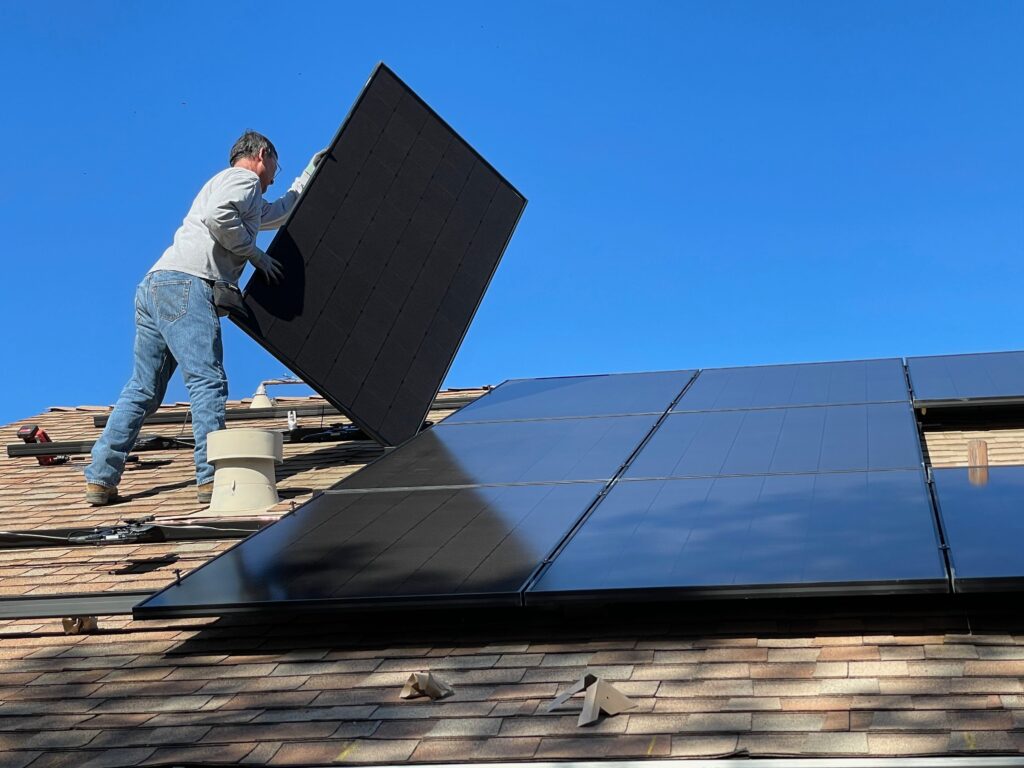
There are a few reasons for this, including:
- High risk of roof leaks
- Lower panel efficiency with DIY solar kits
- Less appealing warranties with DIY panels
We’ll explain the importance of these factors below.
DIY Installations Lead to More Issues
As you might expect, installing solar panels yourself will naturally leave your home at greater risk of roof leaks. Unfortunately, even professional installers can’t always prevent leaks resulting from the roof shingle penetrations required for solar conversion.
DIYers are far more likely to make mistakes that lead to leaks and eventual water damage. While you might save money installing solar panels yourself, the savings can quickly be offset by repairs required if you make errors while installing your panels.
DIY Solar Panels Have a Lower Efficiency Rating
As we mentioned above, MI receives far less sunlight than most states in the U.S., which means residents need to maximize panel efficiency to offset energy bills. Choosing a brand with a higher efficiency rating almost always leads to a faster panel payback period and greater savings in the long run.
Most DIY panels have an efficiency rating well below the industry-leading efficiencies of brands like Maxeon, Tesla and Panasonic. Again, you will spend less installing DIY panels, but you may not save as much over time as you would by having a professional solar panel company install top-quality residential solar panels.
Your Warranty Coverage Will Be Less Appealing
Solar power systems in MI will always be at elevated risk of damage because of the severe weather that frequents the area. Severe thunderstorms and tornadoes can put panels at risk of serious damage, which could necessitate expensive repairs or replacements.
With professionally installed panels, you can get solar warranties that average around 25 years for damage. DIY panel kits more often top out at around five years, which provides far less peace of mind.
DIY solar panels cost less, but having to replace damaged panels could result in overall higher solar energy system costs in the long run in MI.
What Should Michiganders Look For in a Solar Installer?
There are several important things to look for in an installer if you’re planning to go solar in MI. We’ll list some of the most important factors below and explain why each is important in the sections that follow.
- Panel brands offered
- Efficiency warranties
- Physical warranties
- Solar services provided
Panel Brands Offered
MI receives around 20% fewer sunny days per year than most other states and sees a relatively low sunlight intensity, given its northern location, so most residents will want to maximize panel efficiency to ensure they offset as much of their electric bills as possible. This is especially important given that the energy costs in MI are well above average in the U.S.
It’s worth looking at the panel brands offered before choosing an installer. Some companies keep installation costs down by providing below-average equipment brands. We recommend choosing a company that has leading brands like Maxeon/SunPower, Tesla, Panasonic, LG, REC, Qcells, Trina and Canadian Solar.
Efficiency Warranty Coverage
Next, we recommend prioritizing companies that offer robust efficiency warranties. Since sun availability is relatively low in MI, you want panels that are guaranteed to maintain peak production for years to come.
Efficiency warranties do just that — they guarantee a minimal drop in solar panel efficiency over the warranty period. Some of the best panel manufacturers guarantee no lower than 80% efficiency after 25 years.
Physical Damage Warranties
The extreme weather in MI and the above-average tree coverage both put MI PV panels at an elevated risk of damage.9 We suggest looking for companies that provide a lengthy physical damage warranty. This will help you avoid repair and replacement costs after installation.
Solar Services Provided
Finally, we suggest looking for a company that has a good selection of solar services. Most solar companies will install panels, but not all of them will also offer batteries, EV chargers and other solar equipment or energy efficiency upgrades.
As mentioned above, solar batteries can be a great option in MI. They add quite a lot to your total system cost, but they help you maximize the value of your energy production since the state doesn’t mandate net metering.
Additionally, batteries can help maintain electricity through the frequent power outages in MI, providing you with peace of mind regardless of the weather conditions.
Methodology: How We Reviewed the Best Solar Companies in Michigan
Since Michigan is home to around 80 solar installers, we took a scientific approach to ranking the best solar companies in the state. We used six main criteria and researched how each installer in the area performed according to each. We then weighted those factors based on how important we believed each one was. We’ll explain our process below.
- Local reputation and reviews (20%): Since there are so many companies to choose from in Michigan, our first order of business was to rule out providers that are just in the industry to turn a profit and take advantage of the surging demand in the area. We read through dozens of customer reviews for each installer to see how and where each one came up short. We used sites like BBB and Google Reviews and looked at both positive and negative reviews to see how each installer performed overall.
- Pricing and financing (20%): The cost per watt for PV equipment in Michigan — $3.62 — is well above the industry average of $3.33. We prioritize companies that help keep clean energy more affordable by maintaining average or even below-average pricing for panels, batteries and other components. We also prefer companies that accept multiple payment options. Even though leases and PPAs are less beneficial, they can be helpful for customers who can’t afford a cash purchase or qualify for a loan.
- Services offered (20%): We like to promote companies that offer a wide range of services that allow customers to customize their solar setups. Batteries, in particular, are often a necessity in Michigan, where net metering isn’t mandated on a statewide level. We also prefer installers that offer other add-on options and services, like EV chargers, energy efficiency upgrades and more.
- Warranty coverage (20%): Michigan sees above-average amounts of snowfall and severe thunderstorms every year. The snow can expose roof penetrations to moisture that can promote leaking, and intense winds can put excess forces on panels or put them at risk of damage from fallen tree limbs. We rank companies higher that include robust warranty coverage with their systems for these reasons. Specifically, we look for above-average labor warranties to help reduce the risk of out-of-pocket costs for repairs or replacements.
- Company experience (10%): The local solar industry in Michigan is really starting to take off, and we’ve seen less reputable installers pop up to take advantage of the demand. New companies aren’t always less reliable, but they are more likely to go out of business, in which case your warranties could be voided. We like to promote companies that have at least ten years of experience to help avoid issues like this.
- Brand quality (10%): Finally, we look at the brands of solar equipment each installer offers. We like to see a nice range of brands that include affordable options and high-performance options. This helps the company appeal to a wider customer base.
Read More About Going Solar in Michigan
- Is Solar Worth It in Michigan?
- Michigan Solar Incentives Guide
- Find Cost Savings on Solar Panels in Michigan
The cost information presented in this article is derived from a comprehensive analysis, incorporating data from multiple industry sources. The average cost per watt per state was calculated based on figures from Consumer Affairs, Energy Sage, and Berkeley Lab’s Electricity Markets & Policy Department. Additionally, monthly energy consumption and the average monthly cost of electricity were sourced from the U.S. Energy Information Administration, ensuring a well-rounded and accurate representation of the information presented.
FAQ: Best Solar Companies in Michigan
Below, we’ll include our responses to some of the most common questions we see about converting to solar in The Great Lakes State.
Based on our review above, the EcoWatch team believes that The Green Panel is the most reputable solar company in MI. This company has stellar reviews on every platform, a staunch record of excellent customer service and response times, good warranties, affordability, and a solid reputation throughout the state.
Yes, absolutely! Your solar panel system will only ever be as good as your panels, so these play a major role in your energy production and system longevity. There are many manufacturers to choose from, all of which bring varying durability, energy efficiency, and prices to the table.
Most installers only carry a handful of brands, so to some extent you might want to base your choice of installer on the brands it carries. The low sunlight availability in MI means choosing an installer that offers high-efficiency panels is your best bet.
Finding the solar company that offers the cheapest PV panels involves calling multiple installers in your area and asking for solar quotes. This can be tedious, so a better option is to use our EcoWatch ratings to determine the best value company that fits within your budget.
Based on the fact that SunPower is the largest solar company in MI, it probably also has the most experience in terms of installations. This company has also been in the industry longer than most local solar installers in MI.
For many MI homeowners, the most important factor when choosing a solar company is customer service. A company that provides fast responses and good customer care provides more value and fewer headaches, making customer service more important than PV panel cost in most cases.
In our opinion, panel efficiency is just as important. Solar production in MI is naturally low due to weather conditions, so a highly efficient panel will typically save far more on energy bills over the long run.
It might surprise you to not find popular companies like Vivint and Titan Solar Power in our ranking. These companies, along with some others like J. Ranck Electric, have been excluded from our rankings. This was an intentional decision based on one or more factors, including ongoing lawsuits with customers, minimal service area within the State of Michigan, and poor customer service.
Yes! In most states, the utility provider you have won’t make a difference in your solar company selection. However, some companies offer net energy metering in MI, while others don’t because it’s not mandated. Among the companies that do, some offer energy credits at the full retail rate, while most offer a lower, avoided-cost rate.
It’s worth considering what your utility provider offers because it can determine if a solar battery would benefit you. If a battery would help you save money on energy costs, then it’s best to choose an installer that provides access to panels and solar storage solutions.
Top Installers For Michigan
Comparing authorized solar partners
-
- Most efficient panels on the market
- National coverage
- Cradle to Cradle sustainability certification
- Great warranty coverage
- Expensive
- Customer service varies by local dealer
A+Best National Provider1985SunPower Panels25-year all-inclusive warranty
Having trouble deciding? Click below and use our process to receive multiple quotes instead:

 233k
233k  41k
41k  Subscribe
Subscribe 


